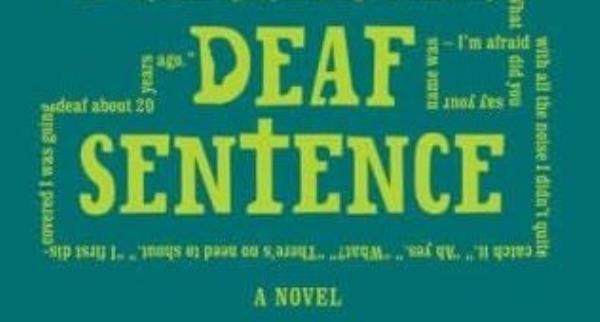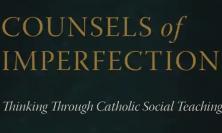Halfway through David Lodge’s latest novel, Deaf Sentence, Desmond Bates, the story’s tetchy, ageing narrator, shares a moment of rare tenderness with his son, Richard. It’s Christmas Day and Richard is about to return home, having refused Desmond’s offer of a camp bed for the night. Relations between the two have grown distant since Desmond remarried following the death of his first wife – Richard’s mother. In an unexpected departure from his usual aloofness, Richard candidly admits to his father that he hasn’t been able to mourn the loss of his mother, partly as a result of not being present at the moment of death. Desmond blames himself for this. Neither of them being the type to hug, they instead shake hands affectionately, sealing the new understanding that now exists between them.
This is all but eclipsed by what follows. Farcical scenes come thick and fast as first Desmond, and then his geriatric father Harry, manage to wreck a Boxing Day party carefully planned by Desmond’s wife Fred (short for Winifred). The final straw comes when Harry, caught short on his way back from the pub, is seen by guests to be having a wee in the front garden. Several leave the party early as a result.
It’s classic Lodge territory, clumsy behaviour and social awkwardness combining to hilarious effect. But – and this is emblematic of the novel as a whole – Lodge isn’t able to bring this episode successfully together with the earlier one: the moment of emotional frankness between father and son gets lost amid the succession of calamitous mishaps that follow it. Here and elsewhere, Deaf Sentence tries to tie poignant reflections on ageing, loss and death into a comedy of manners. It’s not an attempt that ever feels likely to come off, and the clash between the two modes is fully brought out by the time we reach the novel’s incongruously solemn ending.
This is a shame, for in parts Deaf Sentence feels like a return to form for Lodge after his none-too-successful diversion into biographical fiction with Author, Author (2004). We could be back in the world of Rummidge – the location for Lodge’s trio of campus novels Changing Places (1975), Small World (1984) and Nice Work (1988) – only a Rummidge grown substantially greyer and grumpier. Desmond is a recently retired professor of linguistics who spends his days brooding over severe hearing loss and paying the occasional visit to his father in London. Although this puts Deaf Sentence at one remove from the campus novel, all the usual Lodge themes are there: academia, marital fidelity and infidelity, Catholicism, bungled sexual encounters, wry social observation. A frisky young graduate student, Alex Loom, provides the obligatory sexual frisson with some typically plunging necklines and risqué behaviour.
What is new is the theme of deafness, but even this is in a recognisably familiar key. Early on in the novel, Desmond proposes that ‘Deafness is comic, as blindness is tragic.’ Despite some moving reflections on notable cases of hearing loss (Beethoven, Goya, Larkin and others), that is a maxim largely adhered to by Deaf Sentence. Desmond’s mishearings are all of this kind: ‘our arses on’ for ‘Carcasonne’, ‘Crap and sargasso’ for ‘Braque and Picasso’, and the like.
Fortunately, most of the jokes are better than this, and a few of the set-pieces are really very funny indeed. Lodge’s take on the weekend Desmond and his wife spend with friends in ‘Gladeworld’, a holiday village of the Center Parcs variety, is acute satire. Some of the best comedy derives from Desmond’s relationship with his father: there is a wonderful moment when he finds himself attempting to dry out Harry’s underpants (when he has again been caught short) under a hand dryer at a motorway service station. Lodge also includes some characteristically wry reflections on Catholic belief. Even if he has moved away from making Catholicism a major theme of his writing, as he did in The British Museum Is Falling Down (1965) and How Far Can You Go? (1980), Deaf Sentence follows more recent Lodge novels in having it as a significant undercurrent. Desmond is quietly sceptical of his wife’s devotion and can be splendidly mordant about it in private. On her return from Sunday Mass, he reflects: ‘I might ask her what the sermon was like, and she will say something vague in reply – frankly I doubt whether she listens to it attentively – but I wouldn’t dream of asking her if, for example, she received Communion with unreserved assent to the doctrine of transubstantiation.’ Shrewd as this undoubtedly is, Desmond is never scornful: Deaf Sentence’s comedy is, as with so many of Lodge’s novels, of the mild and indulgent kind.
Sometimes too mild. Desmond never seems likely to cheat on his wife with the coquettish Alex. We’ve been here before: Lodge’s novels, for all their sexual shenanigans, almost always contrive a return to the solidity of marriage and the family by their close. Coming as part of Lodge’s social farce, it’s usually relatively easy to gloss over the preceding moral hypocrisies for the sake of a tidy ending. But in Alex Loom’s case it feels more jarring. The ease with which she is vanished at the end of the book does not sit well in a novel whose closing chapters so evidently aspire to be a serious reflection on mortality and grief.
A visit to Auschwitz sets the tone for this final part of the novel, as Desmond becomes aware of ‘the fragility of our grip on life, the ease with which the marks we leave on the surface of the earth are erased.’ Yet he is also led to feel that there is equally great potential for renewal: of human life, knowledge and relationships. Though he never wholly shakes off his natural cynicism, by the end of the novel Desmond is even able to contemplate sincerely the possibility of transcendence.
This could not be further from earlier chapters, when Desmond cheerily recounted his rigorous policing of the quiet coach on trains or went into spasms of anger at the sight of a defaced library book. Which is why it doesn’t really work: the transition from crabby pensioner to profound thinker is too abrupt, too much to attempt in fifty-odd pages, to ever be plausible. Lodge has married social farce and the novel of ideas in the past: Thinks… (2001) included some sprightly disquisitions on consciousness, while the Rummidge novels brilliantly satirised prevailing fashions in literary theory. But whereas earlier novels combined burlesque with more substantial musings, Deaf Sentence splits the two apart. The weightier episodes are tagged on at the end of the novel; the earlier parts are almost wholly taken up with embarrassing but still relatively trifling incidents resulting from Desmond’s hearing loss. Deaf Sentence looks in two different directions – one comic, one serious – and it’s unable to focus truly on either.
The reviewer, Martin Dubois, is a PhD student at Cambridge University.






